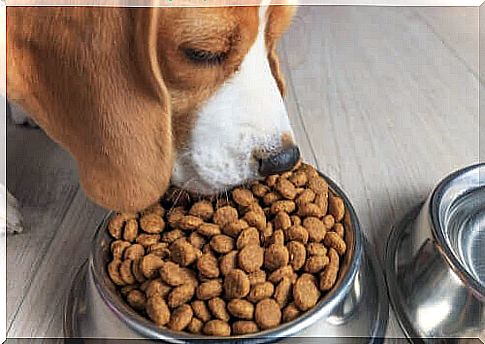Puppy Multivitamins: What Do You Need To Know About It?

Now that you have a puppy, you want to do everything you can to ensure he has a long, healthy life. So maybe you’ve wondered if he needs vitamins to grow healthy. However, before purchasing a puppy multivitamin, you should ask yourself a few questions.
Next, we’ll talk about everything you should consider before deciding if it’s a good idea to give your puppy a multivitamin as part of your diet.
The best start? Choosing the most nutritious multivitamins for puppies
Initially, analyzing multivitamin supplements for puppies can be a daunting task. Where to start and what should you pay attention to? Well, the first place you should look is your dog’s plate.
Good nutrition starts with what you choose to feed your pet each day. This may sound simple, but it’s effective.

With a little knowledge of essential nutrients and the foods that provide a multivitamin supply for puppies, you will already feel better informed and more confident in making a good decision.
A dog needs six essential types of nutrients to live healthily: water, protein, fat, carbohydrates, vitamins and minerals.
However, each dog may need more or less of some of these essentials. The key to getting it right is to understand, in a global way, what the animal’s nutritional requirements are.
Requirements vary based on age, race, health status and activity level. With these factors in mind, you can find foods that meet your pet’s individual needs.
The puppy’s nutritional needs
If the puppy is only a few weeks old, it will probably still be nursing. During breastfeeding, the puppy receives all the necessary nutrition through the mother’s milk.
If he is being bottle-fed, he will usually also receive the nutrients he needs. A commercial breastmilk replacement formula for puppies contains the proper amount of vitamins and minerals it needs to grow.
In fact, during the first year of life, if the diet consists of good quality industrialized puppy food, those marketed as “complete and balanced”, he will be receiving all the vitamins necessary for his development.
Why is it important to provide a source of multivitamins for puppies?

Below, we’ll give a brief overview of the role of vitamins in puppies’ health:
Vitamin A
It is essential for the normal functioning of the retina. It is also responsible for fetal growth, development and immune function.
Complex B vitamins
The B-complex vitamins are a group of vitamins important for metabolism.
- Vitamin B1 or thiamine helps regulate energy, carbohydrate metabolism and neuronal transmission.
- Riboflavin (B2), cobalamins (B12) and niacin (B3) help facilitate enzyme function.
- Vitamin B6 (pyridoxine) is responsible for the generation of glucose, the function of red blood cells and the nervous system. In addition, it also participates in hormonal regulation, immune response, niacin synthesis and gene activation.
- Pantothenic acid (B5) contributes to energy metabolism.
- Folic acid (B9) works on DNA synthesis, repair and methylation, contributing to rapid cell division and growth.
Vitamin C
It is a powerful antioxidant. It scavenges potentially harmful free radicals and can help reduce inflammation and aging.
Vitamin D
Allows your puppy’s body to have a balance of minerals such as phosphorus and calcium for healthy bones.
Vitamin E
Protects against oxidative damage. It is essential for cellular function and fat metabolism. Important for eye and muscle regeneration and for the reproductive process.
Vitamin K
It is critical for activating the blood’s ability to clot.
Supplement or not supplement with multivitamins for puppies
Dogs fed adequate processed foods do not need vitamin supplements. This, no doubt, as long as the vet doesn’t recommend otherwise.

On the other hand, the dogs fed a homemade diet may need supplements in some cases. However, vitamins should only be administered under medical advice.
Although humans and dogs need vitamins, it’s very important to keep in mind that they need them in different amounts than we do. For this reason, it is necessary to use formulations made specifically for dogs.
Multivitamins for Puppies: Are there any risks associated with vitamins for dogs?
We’ve already established that vitamins are absolutely essential for life. However, in excessive amounts, puppy multivitamins can be potentially dangerous.
Some supplements contain other ingredients, such as herbs, that can interact with certain medications. You can avoid these risks by working out a meal plan with your veterinarian.
For example, too much vitamin A can cause dehydration, joint pain, and even damage your dog’s blood vessels. Too much vitamin D can make a dog sick and have potentially fatal consequences.

Why not give the puppy the multivitamin you bought for yourself?
The main reason is that the vitamins can be toxic when ingested in large amounts. Thus, there are 4 potentially toxic ingredients commonly found in human multivitamins. They are: xylitol, vitamin D, iron and calcium.
Sugar-free chewable vitamins usually contain xylitol. This compound can cause signs of low blood sugar and even liver failure in dogs.
Vitamin D, when taken in toxic amounts, can cause a very high level of calcium in the body. This usually results in secondary renal failure.
Iron, which is found in very high levels in prenatal vitamins, can cause severe vomiting, diarrhea, and even organ damage or failure.
In summary, you now know that it is imperative to discuss supplement recommendations with your veterinarian.
If the provider feels the dog needs additional nutrients, he or she will prescribe a puppy kibble or a multivitamin for a while. However, your veterinarian may also recommend that you supplement your dog’s diet with specific fruits and vegetables rather than prescribing multivitamin supplements.







